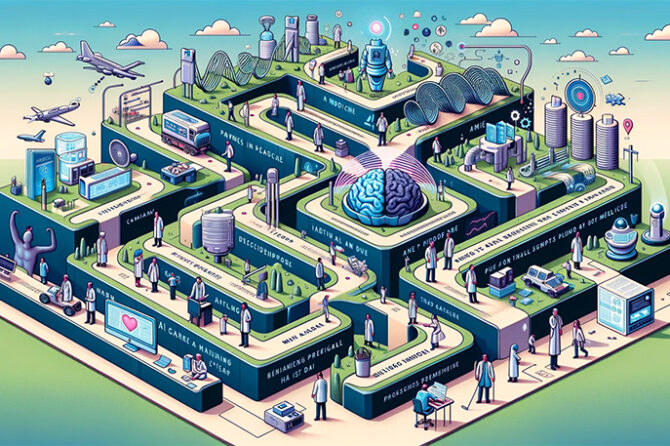
The integration of Artificial Intelligence (AI) in healthcare, particularly through Google’s DeepMind AI model, AMIE (Articulate Medical Intelligence Explorer), is set to transform patient care and medical diagnostics. AMIE is designed to streamline interactions between patients and doctors, simplifying and enhancing medical consultations. This revolutionary development could potentially bridge significant gaps in healthcare.
Challenges in Healthcare
Healthcare systems often present daunting challenges for patients and professionals alike. Patients struggle with medical complexities and the identification of appropriate specialists, while healthcare professionals face demanding schedules, limiting their capacity for personalized care. These issues are exacerbated in areas with limited medical infrastructure. AI innovations, like AMIE, offer promising solutions to these challenges, aiming to improve the efficiency and effectiveness of healthcare services.
Evolution of AI in Medicine
AI’s role in medicine has evolved significantly since the introduction of IBM’s Watson. The progress in this field, although gradual, has been substantial, particularly with the advent of Large Language Models (LLMs) like ChatGPT. The development of AMIE signifies a major leap in this evolution, moving from general-purpose AI to more specialized medical applications.
AMIE: A New Frontier
AMIE represents a significant advancement in AI’s application in healthcare. Unlike typical AI systems, AMIE is adept at processing patient information and elucidating medical conditions in a user-friendly manner. Vivek Natarajan, a lead AI researcher at Google, and Thomas Thesen, an associate professor at Dartmouth’s Geisel School of Medicine, both emphasize AMIE’s role as a supportive tool in healthcare. It’s designed to complement, not replace, the expertise of human physicians.
Training AMIE
AMIE’s training involved an extensive ingestion of real-world medical texts, including physician-patient dialogues and ICU medical notes. However, recognizing the limitation of this data, the DeepMind team employed a simulated diagnostic environment for AMIE. This environment allowed for an iterative learning process through self-play loops, enabling AMIE to refine its diagnostic skills beyond the capacity of human experience.
Comparing AMIE with Human Physicians
In a controlled trial, AMIE was compared with human primary-care providers through consultations with patient actors. The AI demonstrated greater diagnostic accuracy and overall superior performance. However, it’s noteworthy that these consultations occurred via text-based chats, which might have influenced the results. The findings suggest that while AI can significantly enhance medical consultations, the unique aspects of human interaction in healthcare are still vital.
Future Prospects and Challenges
Looking forward, the DeepMind team aims to expand AMIE’s capabilities, including integrating multimodal sources like video chats. Yet, there are challenges ahead, such as ensuring equity and fairness in AI healthcare delivery and conducting robust adversarial testing to prepare AMIE for real-world applications. These initiatives reflect a commitment to advancing AI technology responsibly and ethically in healthcare.
Conclusion
The development of AMIE marks a notable milestone in blending AI with healthcare. This tool is poised to enhance medical care by complementing human expertise. Nonetheless, the journey towards fully integrating AI in medicine involves ongoing challenges, including maintaining ethical practices and ensuring equitable access. As AI becomes more prevalent in clinical practice, fostering AI literacy within medical education becomes essential to ensure future doctors can responsibly use AI tools like AMIE for the betterment of patient care.
Prof. Dr. Prahlada N. B
31 January 204
Chitradurga.

















Prahlada Sir 💐
As said by you ,
AMIE represents a powerful tool at the intersection of AI and healthcare, aiming to improve medical decision-making, enhance patient care, and advance the field of medicine through data-driven insights.
While there are challenges to overcome, the future outlook for AMIE is promising, potentially leading to more accessible, accurate, and empathetic healthcare services. As the technology matures, it holds the promise of revolutionizing medical diagnostics and patient care on a global scale.
Reply